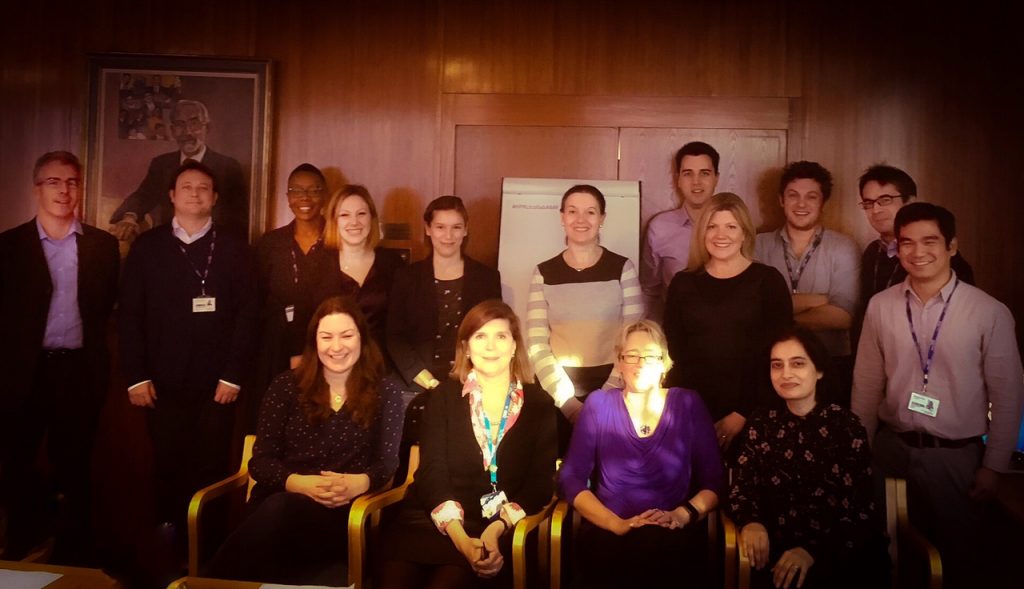This month’s guest blog reports on the programme of social science and interdisciplinary research that is being carried out within the UK’s three NIHR-funded Health Protection Research Units that focus on Hospital-Acquired Infections and Antimicrobial Resistance. Raheelah Ahmad and Sarah Tonkin-Crine’s report into their annual joint meeting gives a flavour of the wide range of interesting and important work on AMR being undertaken in, or associated with, UK NHS and public health settings. The value of synergies generated by expanding cross-disciplinary collaboration in AMR and HCAI research was evident at the meeting and the report describes a number of interesting issues and opportunities for further research.
by Raheelah Ahmad & Sarah Tonkin-Crine
At the end of last year the NIHR Health Protection Research Units for Antimicrobial Resistance (AMR) and Healthcare Associated Infections (it’s a mouthful), convened for the annual meet, to exchange new investigative approaches, share findings and ensure synergies and collaboration in behavioural research. Professors Alison Holmes (Imperial) and Sarah Walker (Oxford) co-chaired.
Liberally plied with watermelon, sandwiches and hot beverages, researchers from Imperial, Oxford, UCL, Bristol and Public Health England (PHE) grappled and debated what more? what next? as well as who? We did our best to refrain from the usual finger pointing (at the different professional groups and different sections of the public); so less of the ‘who dunnit?’ and ‘who should fix it?’ to more ‘how can we fix this together?’ The participant list boasted a healthy smattering of social scientists, behavioural economists, epidemiologists, sociologists and those from cross-disciplinary management sciences. Professionally, GPs, Infectious Disease (ID) consultants, pharmacists, nurses, and microbiologists were around the table.
Following on from the first meeting in November 2015, Sarah Walker kicked off with an update of progress on collaborative projects. Sarah Tonkin-Crine and Annegret Schneider, both Health Psychologists, co-presented findings from a mixed method process evaluation of the latest AMR trial from PHE. Two talks focused on patient/professional communication: Tim Rawson (ID junior doctor and BRC Fellow) reported on his qualitative study to help shape enhanced communication resources and methods in the acute hospital setting; Donna Lecky (PHE) shared learning on the development of TARGET patient leaflets for urinary tract infections in the GP setting during consultations to change prescribing expectations and behaviour. At the population level, findings on public attitudes to antibiotic use and resistance and implications for national level interventions were the theme of talks from Larry Roope (economist) and Tim Chadborn (Behavioural Insights Lead at PHE). From an international perspective Annegret Schneider gave a whistle stop tour on use of behavioural theories to develop interventions in the context of China. Alastair Hay (GP) provided insights from intervention development targeting GPs and parents to manage children with respiratory tract infections. For capturing the multiple policies implemented in the primary care setting, Raheelah Ahmad (NIHR Knowledge Mobilisation Fellow) used an organisational behaviour and strategic management lens to show the potential of System Dynamics to model knowledge mobilisation activities.
Alison Holmes chaired the afternoon in-depth discussion and Esmita Charani (Research Pharmacist) scribed the action points for the year ahead. The need for capturing evaluation and learning when new national level campaigns are rolled out was reiterated. The group reflected upon the opportunities for interventions aimed at different stakeholders before, during and after consultations within organised healthcare. How to optimise opportunities along the life-course as the public traverse in and out of the ‘patient’ role were also discussed.
The day was eloquently bought to a close with a frank and helpful talk from Helen Lambert. Helen encouraged recognition and use of the full breadth of social science disciplines and also drew on her international experiences. We had certainly exposed ourselves to new ideas, reflected and challenged our own logic models. In addition, as researchers and many as health professionals, we reminded ourselves of the need for reflexivity.

